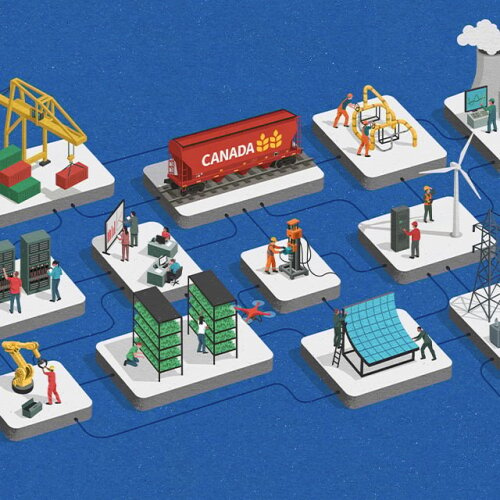Best Oil, Gas & Energy Lawyers in Canada
Share your needs with us, get contacted by law firms.
Free. Takes 2 min.
Or refine your search by selecting a city:
List of the best lawyers in Canada
About Oil, Gas & Energy Law in Canada
Canada is a global leader in the oil, gas, and energy sectors, offering a diverse landscape of natural resources. The country's vast deposits of oil sands, natural gas, and renewable energy resources like hydroelectric and wind power, position it as a critical player in the global energy market. Legal frameworks governing these sectors are complex due to the need to balance economic interests, environmental protection, and indigenous rights. Understanding these frameworks is essential for anyone involved in the industry.
Why You May Need a Lawyer
Engaging with the oil, gas, and energy industries can involve intricate legal matters. Here are some common situations where legal advice may be required:
- Regulatory Compliance: Navigating federal and provincial regulations and ensuring compliance with environmental laws and safety standards.
- Contract Negotiation: Drafting and negotiating contracts for exploration, extraction, or distribution rights.
- Land Use and Property Rights: Resolving issues concerning land use agreements, easements, and property rights, especially involving indigenous lands.
- Litigation: Legal disputes can arise over contracts, environmental impacts, or accidents, requiring litigation or arbitration.
- Transactions and Mergers: Legal expertise is crucial for financing, mergers, or acquisition of energy assets.
Local Laws Overview
Energy-related laws in Canada can vary significantly between provinces due to differing provincial regulations. However, some key aspects include:
- Environmental Protection: Laws such as the Canadian Environmental Protection Act and provincial counterparts regulate emissions and environmental assessments.
- Indigenous Rights: The duty to consult and accommodate indigenous communities is a critical legal requirement for energy projects affecting traditional lands.
- Regulatory Agencies: Agencies like the Canada Energy Regulator oversee interprovincial and international pipeline transmission and energy developments.
- Renewable Energy Laws: Provincial programs and incentives promote renewable energy projects, guided by specific legislation and policies.
Frequently Asked Questions
What is the role of the Canada Energy Regulator?
The Canada Energy Regulator (CER) oversees the regulation of oil, gas, and renewable energy infrastructure that crosses provincial or national borders, ensuring safety and environmental protection.
How do environmental assessments impact energy projects?
Environmental assessments are crucial as they evaluate the potential environmental impacts of a project and help determine mitigation measures, influencing project approval and execution.
Do I need permission to explore for oil and gas on my land?
Yes, landowners usually need to comply with provincial regulations, obtain any necessary permits, and often negotiate with energy companies through lease agreements.
Can indigenous communities stop an energy project?
Indigenous communities have significant rights to consultation and accommodation, which can influence project outcomes, particularly if the project impacts their traditional lands.
Are there incentives for renewable energy projects?
Yes, Canada and its provinces offer various incentives, tax breaks, and subsidies to encourage the development of renewable energy projects.
What are the consequences for non-compliance with environmental regulations?
Non-compliance can result in fines, project delays, increased scrutiny, legal disputes, and reputational harm.
How are energy disputes typically resolved?
Disputes in the energy sector can be resolved through negotiation, mediation, arbitration, or litigation, depending on the contractual agreements and the nature of the dispute.
What should I expect in an energy contract?
An energy contract typically includes terms on pricing, delivery, responsibilities, liabilities, and dispute resolution methods.
How do mergers and acquisitions work in this sector?
Mergers and acquisitions involve detailed due diligence, valuation, negotiation of terms, and compliance with legal and regulatory requirements.
Does each province have different energy regulations?
Yes, energy regulation is largely provincial, which means each province can have different policies, especially concerning electricity markets and renewable energy incentives.
Additional Resources
For further assistance, consider reaching out to:
- Canada Energy Regulator: A federal body overseeing energy infrastructure and markets.
- Provincial Energy Ministries: Each province has a ministry responsible for its energy policy and regulation.
- Environmental Organizations: Groups like the Pembina Institute provide insights and reports on sustainable energy practices.
- Legal Firms Specializing in Energy Law: Firms with expertise in this field can offer personalized advice and representation.
Next Steps
If you require legal assistance in the oil, gas, and energy sector, consider the following steps:
- Research: Understand your specific legal needs and familiarize yourself with relevant laws and regulations.
- Consult Professionals: Seek advice from lawyers who specialize in energy law for an initial consultation.
- Documentation: Gather and organize all relevant documents and information pertaining to your case.
- Engage Legal Counsel: Hire a lawyer or law firm that can best represent your interests and navigate the legal complexities of your case.
- Stay Informed: Keep abreast of any changes in laws or policies that might impact your situation.
Lawzana helps you find the best lawyers and law firms in Canada through a curated and pre-screened list of qualified legal professionals. Our platform offers rankings and detailed profiles of attorneys and law firms, allowing you to compare based on practice areas, including Oil, Gas & Energy, experience, and client feedback.
Each profile includes a description of the firm's areas of practice, client reviews, team members and partners, year of establishment, spoken languages, office locations, contact information, social media presence, and any published articles or resources. Most firms on our platform speak English and are experienced in both local and international legal matters.
Get a quote from top-rated law firms in Canada — quickly, securely, and without unnecessary hassle.
Disclaimer:
The information provided on this page is for general informational purposes only and does not constitute legal advice. While we strive to ensure the accuracy and relevance of the content, legal information may change over time, and interpretations of the law can vary. You should always consult with a qualified legal professional for advice specific to your situation.
We disclaim all liability for actions taken or not taken based on the content of this page. If you believe any information is incorrect or outdated, please contact us, and we will review and update it where appropriate.
Browse oil, gas & energy law firms by city in Canada
Refine your search by selecting a city.














